Abstract
The flux of serine biosynthesis in the liver of the normal rabbit, and of the rat on a low protein diet, is most sensitive to the activity of phosphoserine phosphatase (flux control coefficient up to 0.97), the last of the three enzymes in the pathway after it branches from glycolysis. The concentration of the pathway product, serine, has a strong controlling influence on the flux (response coefficient up to -0.64) through feedback inhibition at this step. The pathway is therefore controlled primarily by the demand for serine rather than the supply of the pathway precursor, 3-phosphoglycerate. Under conditions where there is a lower biosynthetic flux, the flux control coefficients of the first two enzymes of the pathway are increased, and are probably dominant in the rat on a normal diet. In rabbit liver, when ethanol is used to inhibit serine biosynthesis, control can be distributed between the three enzymes, even though the reactions catalysed by the first two remain close to equilibrium. Apart from their intrinsic value in aiding the understanding of the regulation of mammalian serine metabolism, our findings illustrate the danger of assuming that there are invariant design principles in the regulation of metabolic pathways, such as feedback control on the first step after a branch.
Full text
PDF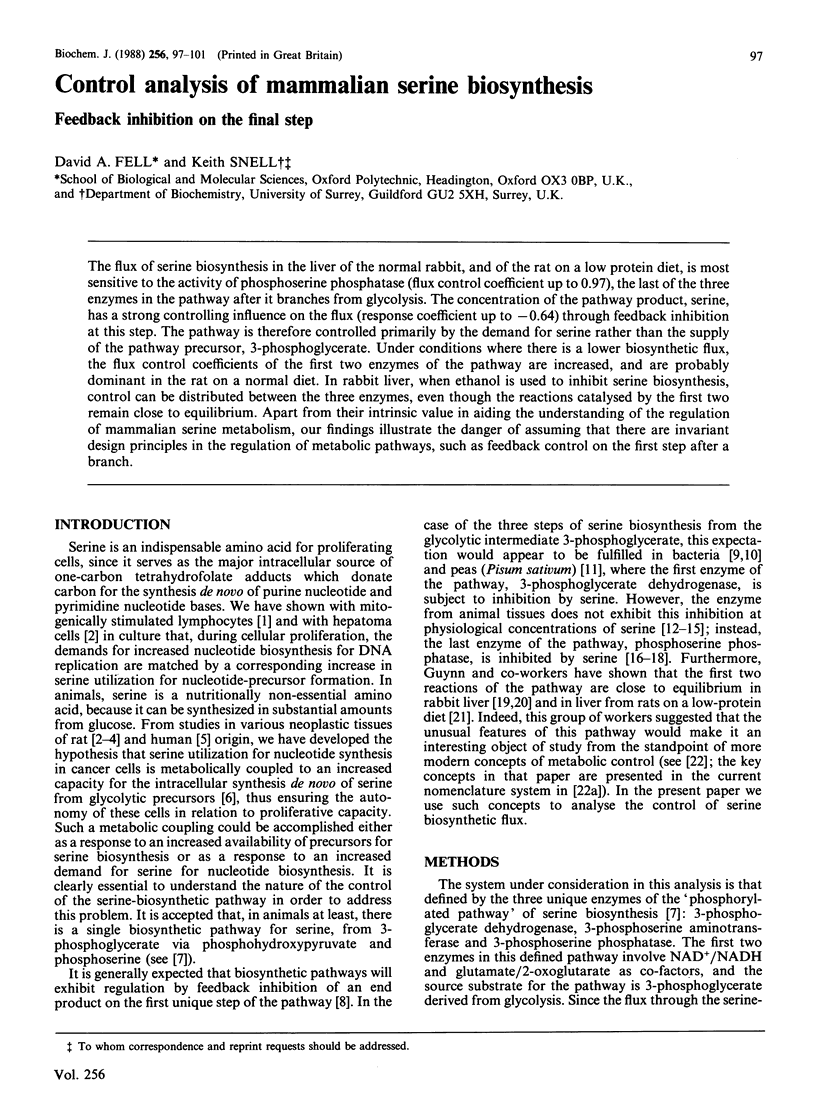
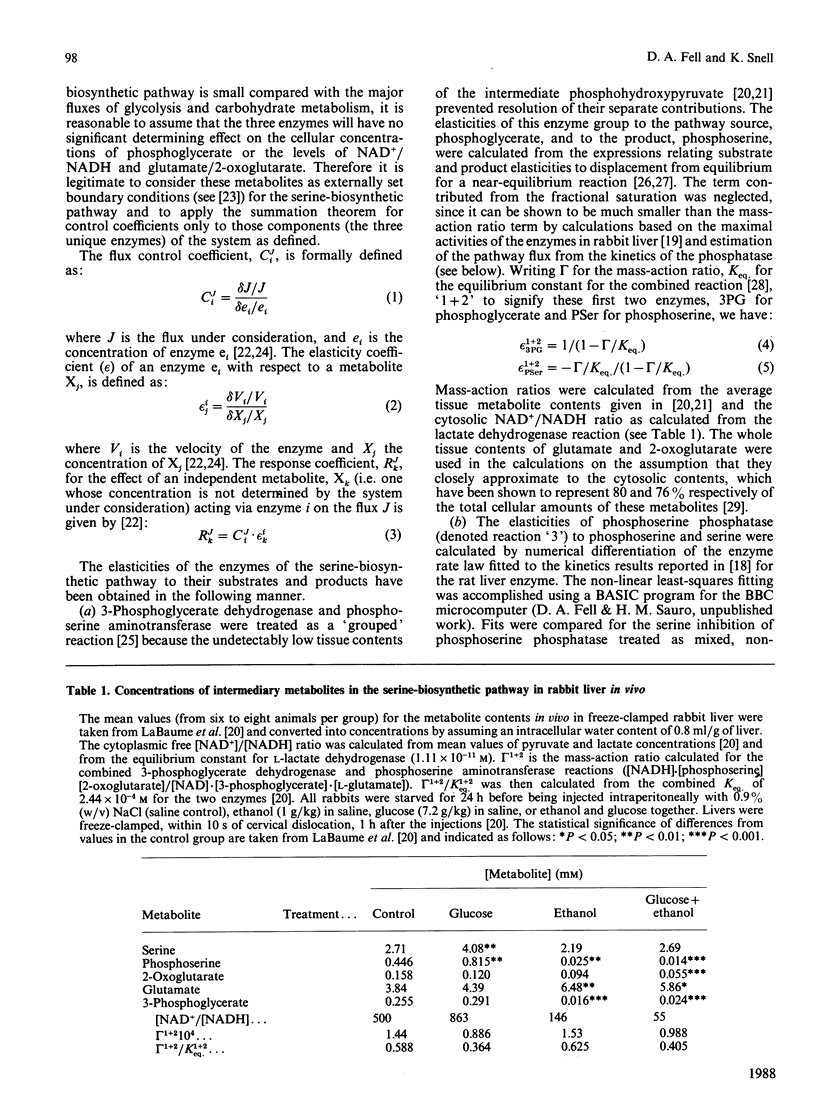
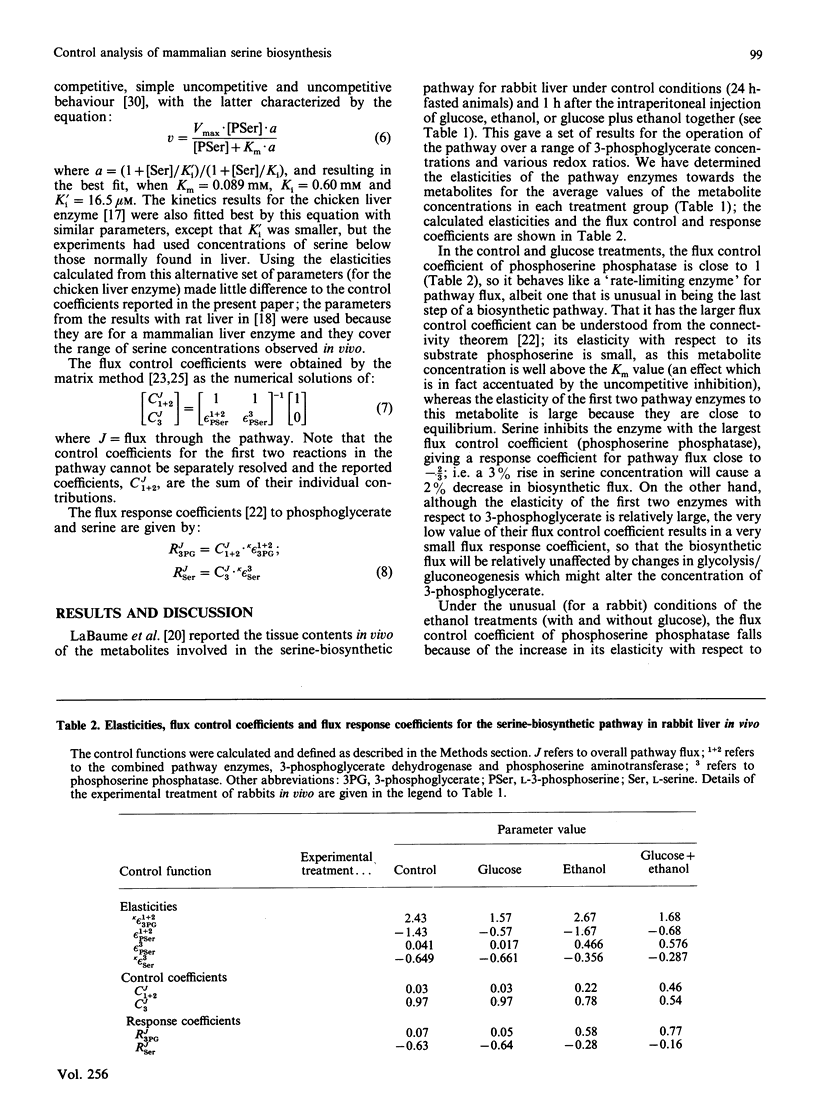
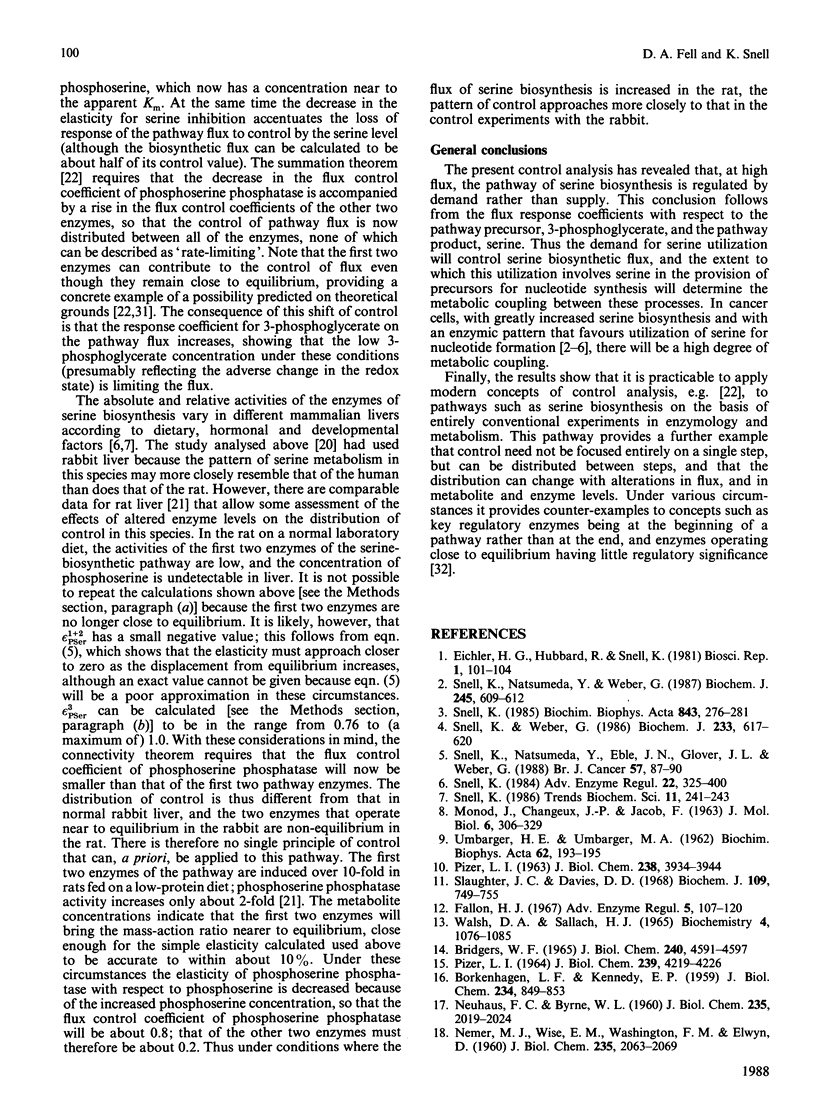
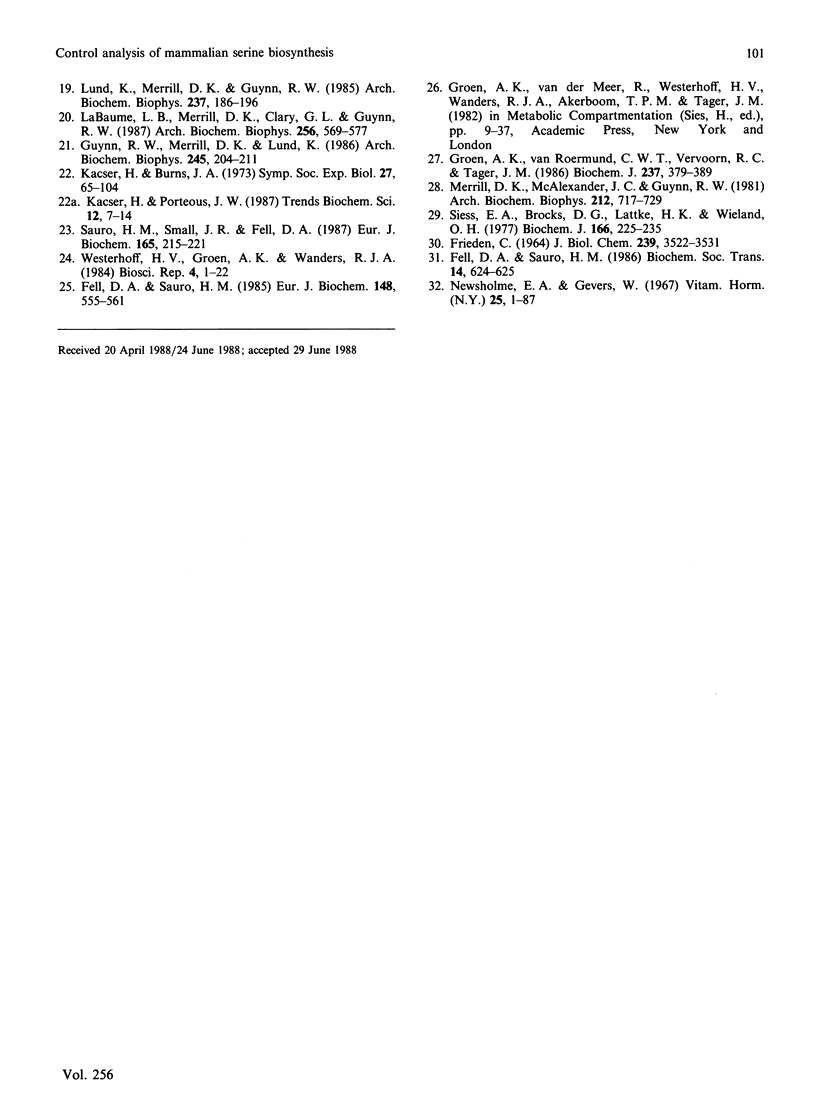
Selected References
These references are in PubMed. This may not be the complete list of references from this article.
- BORKENHAGEN L. F., KENNEDY E. P. The enzymatic exchange of L-serine with O-phospho-L-serine catalyzed by a specific phosphatase. J Biol Chem. 1959 Apr;234(4):849–853. [PubMed] [Google Scholar]
- Bridgers W. F. The biosynthesis of serine in mouse brain extracts. J Biol Chem. 1965 Dec;240(12):4591–4597. [PubMed] [Google Scholar]
- Eichler H. G., Hubbard R., Snell K. The role of serine hydroxymethyltransferase in cell proliferation: DNA synthesis from serine following mitogenic stimulation of lymphocytes. Biosci Rep. 1981 Feb;1(2):101–106. doi: 10.1007/BF01117006. [DOI] [PubMed] [Google Scholar]
- FRIEDEN C. TREATMENT OF ENZYME KINETIC DATA. I. THE EFFECT OF MODIFIERS ON THE KINETIC PARAMETERS OF SINGLE SUBSTRATE ENZYMERS. J Biol Chem. 1964 Oct;239:3522–3531. [PubMed] [Google Scholar]
- Fallon H. J. Regulatory phenomena in mammalian serine metabolism. Adv Enzyme Regul. 1967;5:107–120. doi: 10.1016/0065-2571(67)90012-x. [DOI] [PubMed] [Google Scholar]
- Fell D. A., Sauro H. M. Metabolic control and its analysis. Additional relationships between elasticities and control coefficients. Eur J Biochem. 1985 May 2;148(3):555–561. doi: 10.1111/j.1432-1033.1985.tb08876.x. [DOI] [PubMed] [Google Scholar]
- Groen A. K., van Roermund C. W., Vervoorn R. C., Tager J. M. Control of gluconeogenesis in rat liver cells. Flux control coefficients of the enzymes in the gluconeogenic pathway in the absence and presence of glucagon. Biochem J. 1986 Jul 15;237(2):379–389. doi: 10.1042/bj2370379. [DOI] [PMC free article] [PubMed] [Google Scholar]
- Guynn R. W., Merrill D. K., Lund K. The reactions of the phosphorylated pathway of L-serine biosynthesis: thermodynamic relationships in rat liver in vivo. Arch Biochem Biophys. 1986 Feb 15;245(1):204–211. doi: 10.1016/0003-9861(86)90206-7. [DOI] [PubMed] [Google Scholar]
- Kacser H., Burns J. A. The control of flux. Symp Soc Exp Biol. 1973;27:65–104. [PubMed] [Google Scholar]
- LaBaume L. B., Merrill D. K., Clary G. L., Guynn R. W. Effect of acute ethanol on serine biosynthesis in liver. Arch Biochem Biophys. 1987 Aug 1;256(2):569–577. doi: 10.1016/0003-9861(87)90614-x. [DOI] [PubMed] [Google Scholar]
- Lund K., Merrill D. K., Guynn R. W. The reactions of the phosphorylated pathway of L-serine biosynthesis: thermodynamic relationships in rabbit liver in vivo. Arch Biochem Biophys. 1985 Feb 15;237(1):186–196. doi: 10.1016/0003-9861(85)90268-1. [DOI] [PubMed] [Google Scholar]
- MONOD J., CHANGEUX J. P., JACOB F. Allosteric proteins and cellular control systems. J Mol Biol. 1963 Apr;6:306–329. doi: 10.1016/s0022-2836(63)80091-1. [DOI] [PubMed] [Google Scholar]
- Merrill D. K., McAlexander J. C., Guynn R. W. Equilibrium constants under physiological conditions for the reactions of D-3-phosphoglycerate dehydrogenase and L-phosphoserine aminotransferase. Arch Biochem Biophys. 1981 Dec;212(2):717–729. doi: 10.1016/0003-9861(81)90416-1. [DOI] [PubMed] [Google Scholar]
- NEMER M. J., WISE E. M., Jr, WASHINGTON F. M., ELWYN D. The rate of turnover of serine and phosphoserine in rat liver. J Biol Chem. 1960 Jul;235:2063–2069. [PubMed] [Google Scholar]
- NEUHAUS F. C., BYRNE W. L. Metabolism of phosphoserine. III. Mechanism of O-phosphoserine phosphatase. J Biol Chem. 1960 Jul;235:2019–2024. [PubMed] [Google Scholar]
- Newsholme E. A., Gevers W. Control of glycolysis and gluconeogenesis in liver and kidney cortex. Vitam Horm. 1967;25:1–87. doi: 10.1016/s0083-6729(08)60033-3. [DOI] [PubMed] [Google Scholar]
- PIZER L. I. ENZYMOLOGY AND REGULATION OF SERINE BIOSYNTHESIS IN CULTURED HUMAN CELLS. J Biol Chem. 1964 Dec;239:4219–4226. [PubMed] [Google Scholar]
- PIZER L. I. THE PATHWAY AND CONTROL OF SERINE BIOSYNTHESIS IN ESCHERICHIA COLI. J Biol Chem. 1963 Dec;238:3934–3944. [PubMed] [Google Scholar]
- Sauro H. M., Small J. R., Fell D. A. Metabolic control and its analysis. Extensions to the theory and matrix method. Eur J Biochem. 1987 May 15;165(1):215–221. doi: 10.1111/j.1432-1033.1987.tb11214.x. [DOI] [PubMed] [Google Scholar]
- Siess E. A., Brocks D. G., Lattke H. K., Wieland O. H. Effect of glucagon on metabolite compartmentation in isolated rat liver cells during gluconeogenesis from lactate. Biochem J. 1977 Aug 15;166(2):225–235. doi: 10.1042/bj1660225. [DOI] [PMC free article] [PubMed] [Google Scholar]
- Slaughter J. C., Davies D. D. Inhibition of 3-phosphoglycerate dehydrogenase by l-serine. Biochem J. 1968 Oct;109(5):749–755. doi: 10.1042/bj1090749. [DOI] [PMC free article] [PubMed] [Google Scholar]
- Snell K. Enzymes of serine metabolism in normal and neoplastic rat tissues. Biochim Biophys Acta. 1985 Dec 13;843(3):276–281. doi: 10.1016/0304-4165(85)90149-7. [DOI] [PubMed] [Google Scholar]
- Snell K. Enzymes of serine metabolism in normal, developing and neoplastic rat tissues. Adv Enzyme Regul. 1984;22:325–400. doi: 10.1016/0065-2571(84)90021-9. [DOI] [PubMed] [Google Scholar]
- Snell K., Natsumeda Y., Eble J. N., Glover J. L., Weber G. Enzymic imbalance in serine metabolism in human colon carcinoma and rat sarcoma. Br J Cancer. 1988 Jan;57(1):87–90. doi: 10.1038/bjc.1988.15. [DOI] [PMC free article] [PubMed] [Google Scholar]
- Snell K., Natsumeda Y., Weber G. The modulation of serine metabolism in hepatoma 3924A during different phases of cellular proliferation in culture. Biochem J. 1987 Jul 15;245(2):609–612. doi: 10.1042/bj2450609. [DOI] [PMC free article] [PubMed] [Google Scholar]
- Snell K., Weber G. Enzymic imbalance in serine metabolism in rat hepatomas. Biochem J. 1986 Jan 15;233(2):617–620. doi: 10.1042/bj2330617. [DOI] [PMC free article] [PubMed] [Google Scholar]
- UMBARGER H. E., UMBARGER M. A. The biosynthetic pathway of serine in salmonella typhimurium. Biochim Biophys Acta. 1962 Jul 30;62:193–195. doi: 10.1016/0006-3002(62)90515-2. [DOI] [PubMed] [Google Scholar]
- Walsh D. A., Sallach H. J. Purification and properties of chicken liver D-3-phosphoglycerate dehydrogenase. Biochemistry. 1965 Jun;4(6):1076–1085. doi: 10.1021/bi00882a015. [DOI] [PubMed] [Google Scholar]
- Westerhoff H. V., Groen A. K., Wanders R. J. Modern theories of metabolic control and their applications (review). Biosci Rep. 1984 Jan;4(1):1–22. doi: 10.1007/BF01120819. [DOI] [PubMed] [Google Scholar]


